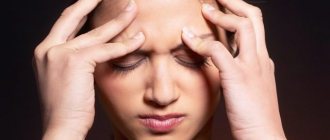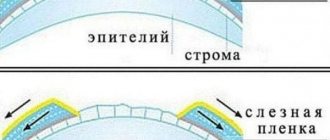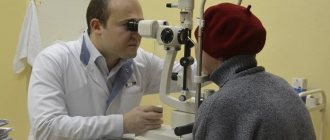Causes of severe dizziness
Many women complain of dizziness along with nausea and weakness. The reason for this may be overwork at work, especially if the nutrition is poor and exposure to fresh air is minimal. It's not just workaholics who experience severe dizziness.
The main reasons for poor health in women:
| Name | Description |
| Heavy periods | With blood loss, the level of iron in the body decreases, which causes dizziness. |
| Anemia | Lack of hemoglobin leads to rapid fatigue and weakness. |
| Pregnancy | Hormonal imbalance provokes not only nausea, but also dizziness. |
| Osteochondrosis | Prolonged sedentary work provokes headaches. Compression of the blood vessels occurs, which leads to poor circulation and dizziness. |
| Psychological disorders | Poor health is provoked by disruptions in the functioning of the central nervous system. The same goes for panic attacks and phobias. |
| Migraine | Vertigo is caused by frequent headaches. |
In women, severe dizziness occurs due to malignant processes in the brain. Therefore, it is important to undergo a full examination in order to begin therapy in a timely manner.
In men, dizziness is caused by the following factors:
| Name | Description |
| Bad habits | Abuse of alcoholic beverages leads to severe dizziness. This is explained by the fact that alcohol breakdown products (toxins) accumulate in a man’s body. |
| Emotional stress | Men endure stress more difficultly because they carry all their problems within themselves. They try to calm their emotional distress on their own by resorting to drinking cigarettes and alcoholic beverages. |
| Diseases | Brain tumor, heart attack, stroke, vegetative-vascular dystonia, migraine, inflammation of the inner ear. |
Jumps in blood pressure, changes in climatic conditions or activity also lead to sudden dizziness.
Other reasons
Frequent dizziness and darkening of the eyes - consider Any
Very often, the main prerequisites for an uncomfortable state are physiological processes that take place in the body. This may be the following reason, or there may be several of them:
- A sharp increase in adrenaline in the blood, which occurs just when you get up, or when a person himself experiences either strong excitement or strong joy. For example, when he receives a declaration of love, or when he speaks at public events;
- Inability to focus your gaze on nearby objects after looking at them for a long time, or after looking at something at a very distant distance;
- Long stay at altitude;
- Performing serious physical exercises for a long time, which include sudden turns or rotations of the head;
- Following diets in which the human body faces a severe lack of glucose;
- Taking certain antibiotics, strong antiseptics or tranquilizers.
Why does my vision get dark and my head feel dizzy? Let's look at the most common reasons.
Adrenaline. A strong increase in its level in the blood occurs when a person experiences sudden severe stress or stress. The same thing happens when you suddenly get out of bed, before performing on stage, etc.
Height . If a person has blocked ears, then it is likely that he spent a lot of time at altitude. Sometimes, with a fear of heights, an adrenaline rush occurs.
Diet. The main nutrient for the body after oxygen is glucose.
If a person follows a diet, then the amount of glucose begins to drop significantly and there is not enough of it to power the processes in the body. Although nutrients are drawn out from fat deposits in small quantities, this happens very slowly, so the required amount of glucose is not provided.
For this reason, darkening of the eyes and dizziness may occur.
Physical exercise . If a person is not sufficiently trained, then he is prohibited from suddenly starting with intense physical exercise. Heavy loads and sudden movements can cause dizziness, darkening of the eyes and stuffy ears. It is recommended to start with light exercises, gradually increasing the load.
Attacks of sudden darkening in the eyes can occur periodically or systematically once or twice a day. There are many reasons for such a change in well-being; this is how the body signals a violation.
Only a specialist can determine the exact cause by examining the patient, interviewing him and receiving the results of a diagnostic examination (ECG, MRI, etc.). This may be a symptom of a developing disease, a consequence of injury or illness, or a one-time reaction to an external factor, for example, overheating in the sun.
Osteochondrosis of the cervical spine
Diseases accompanied by such symptoms can often threaten a person’s life. These include, first of all, brain tumors.
In this condition, pain may increase gradually. Very often the tumor is accompanied by nausea, dizziness, vomiting and weakness throughout the body.
That is why it is also important to seek help from a doctor if the above signs appear. This step can save not only health, but also human life.
Another factor associated with the appearance of headaches may be sinusitis (frontal sinusitis or sinusitis). In case of exacerbation of the disease, patients complain of pain from the affected sinus and high temperature. The last symptom always indicates the presence of internal inflammation, so it cannot be ignored. Competent therapy can protect against the development of quite serious complications.
Complaints of headache are often explained by exacerbation of cervical osteochondrosis. As a rule, the disease develops in people leading a sedentary lifestyle.
In this case, some nerves are pinched, which entails the formation of severe pain. Initially, discomfort is localized in the neck area.
Then the pain begins to “move” upward, radiating into the eyes. Each time it only intensifies when tilting the head and turning.
An additional symptom indicating this particular disease is pain in the chest area. Some people experience a slight increase in temperature.
To avoid the development of osteochondrosis, doctors recommend leading a healthy lifestyle, moving more often and playing sports. If the disease already exists, you should consult a doctor who will recommend appropriate treatment (medications, physical therapy, alternative medicine prescriptions).
An accurate medical history will help the specialist determine the causes of the negative phenomenon:
- prolonged stay at high altitude;
- heavy physical overload;
- taking certain medications;
- psycho-emotional impact;
- sudden switching of vision to other objects;
- passion for exhausting diets;
- various anemias.
Under no circumstances should you self-medicate or listen to the advice of well-wishers. You should always remember that these conditions can be caused by severe pathologies and require urgent medical intervention.
Causes of blurred vision and dizziness (riteil63.ru)
Quite often, people encounter a situation where they feel dizzy or have fog in front of their eyes. In such cases, you should not distance yourself from solving the problem. It is reasonable to contact a specialist who will find out what the cause of the incident is. The human body can signal problems in its functioning in this way.
The patient may feel dizzy and have dark vision in two cases: with diseases of the brain or damage to the organ of vision. Blurred vision may be constant or occur periodically. It can be complete or partial. These characteristics allow the doctor with a high degree of probability to guess the cause of this condition and make a preliminary diagnosis.
Sudden darkening of the eyes and dizziness can occur due to the following reasons:
- acute arterial hypotension (low blood pressure);
- anemia, or anemia, in which the number of red blood cells and hemoglobin in the blood decreases;
- repeated psycho-emotional stress;
- neurocirculatory dystonia, which is accompanied by dysregulation of vascular tone;
- pregnancy.
If dizziness and darkening of the eyes constantly bother the patient, then one can think about the following pathological conditions:
- cerebral atherosclerosis;
- developmental anomalies of the vertebral arteries;
- temporal arteritis;
- brain tumors;
- arterial hypertension.
When a patient becomes dizzy and suddenly has dark vision, it is necessary to rule out a stroke. If there are such manifestations of the disease, you should immediately call an ambulance team. Signs of a stroke may include the following symptoms:
- when protruding, the tongue deviates in one direction or another;
- when you look, you can see a squint;
- During a conversation, speech becomes slurred.
The cause of weakness, sudden darkening of the eyes, headache and dizziness, as a rule, is insufficient blood supply to the brain with a “flush of heat to the head”, “lightheadedness”. It may also be a dissecting aortic aneurysm.
Most often, the vision suddenly becomes dark due to a sharp decrease in blood pressure (attack of hypotension). This, in turn, occurs as a result of a sharp change in body posture in space or due to excessive physical exertion and emotional stress.
A drop in blood pressure is often accompanied by headaches and pain in the neck. During acute hypotension, a person may feel weak, tired, and dizzy.
Surely many people have experienced darkening of their eyes at least once in their lives. This symptom can manifest itself either constantly or intermittently. Moreover, darkening in the eyes can accompany not only a weakened, but also a completely healthy person.
Before starting treatment for this pathological condition, it is necessary to understand that it is caused by both overwork and serious illnesses. The following causes of headaches that radiate to the eyes can be identified:
- Excessive fatigue and tension of the visual organs. If this condition is very strong, then the person feels weak and the eyes become red. Another reason for the appearance of pain is the incorrect selection of contact lenses or glasses, which increases the load on the visual organ.
- Migraine. This is a complex disease; a characteristic feature is the presence of headaches only on the left or right side of the skull. In this case, sensations appear in the temples and the back of the head. Turning your eyes, coughing, or moving your head only increases discomfort. An additional symptom is nausea. Even a child can develop migraine.
- Cluster headache. In this case, the discomfort is very strong. It covers almost the entire head. In this case, the right or left eye may hurt separately. Until now, the exact cause of this pathological condition has not been determined. Regular painkillers will not relieve the sensation. An additional symptom can be considered increased tearing, as well as redness of the eyes.
- Impaired circulation of cerebrospinal fluid. It is characterized by the following symptoms: headache, high temperature, decreased heart rate, loss of appetite. In addition, the patient feels dizzy and nauseous. The cause of this condition is spinal injury, congenital defects that provoke improper formation of the spinal cord.
- Sinusitis. There is not only a headache, but also discomfort in the area of the affected sinus (on the left or right side of the skull). In addition, the patient develops a symptom such as fever, which indicates the development of an inflammatory process.
The most common cause of headaches that radiate to the eyes is hypertension or high blood pressure. Pain in the eyes is associated with increased intraocular pressure.
What are the different types of dizziness?
Severe dizziness (causes in women can be physiological or pathological) requires medical attention. To select the most effective therapy, it is necessary to establish the source of poor health.
In medicine, the following types of dizziness are distinguished:
| Name | Description |
| False (non-systemic) | A person experiences a number of specific sensations, including weakness and darkening of the eyes. Blood pressure also decreases, and a feeling of fear and anxiety appears. Stability when walking is impaired. |
| True (system) | The head is spinning as a result of a malfunction of a certain system in the human body (muscular, visual, vestibular). In some situations, systemic vertigo occurs after a stroke. It seems to a person that his body or surrounding objects are rotating and swaying. |
| Peripheral | Pathological processes are provoked by damage to the inner ear or disorders of the vestibular apparatus. |
| Central | Severe dizziness occurs due to a serious pathology (tumor, stroke, brain injury). |
Considering the degree of intensity, dizziness is also classified into certain types:
Diseases of the vestibular apparatus are the causes of severe dizziness
| Name | Description |
| Lung | It occurs in people who lead a predominantly sedentary lifestyle and move little, after a sudden change in position. |
| Strong | Dizziness is caused by serious illnesses or injuries, damage to the systems of the human body. |
The therapy prescribed by the doctor depends on the form and degree of development of pathological processes.
Signs of vertigo syndrome
Dizziness is divided into systemic (vestibular) and non-systemic. Systemic vertigo refers to the illusory rotation of objects around the patient or the patient around objects, a change in the position of the body in space - falling, as if into an abyss, or taking off.
Associated signs that darkening of the eyes and dizziness have appeared are loss of balance, stuffy ears or one ear, nausea. This type of dizziness indicates that some parts of the central nervous system or ears are affected.
Non-systemic dizziness includes sensations of rotation inside the head. Symptoms include staggering while walking (“drunken gait”), weakness, double contours of objects, darkness in the eyes when standing up suddenly, and a feeling of a veil. The cause of this condition may be a dysfunction of the brain. In this case, attacks can last seconds or even several days.
Additional symptoms
Severe dizziness (a therapist will help identify the causes in women) is accompanied by characteristic symptoms. They will help the doctor determine the diagnostic complex and establish a diagnosis, and then prescribe treatment.
Additional symptoms include the following:
- weak pulse;
- pallor and coldness in the upper extremities;
- vomit;
- nausea;
- fever and cold sweat;
- darkening of the eyes;
- weakness in the body;
- lack of coordination.
A person lacks air, his mood worsens, irritability and excitability appear. Symptoms occur spontaneously and recur periodically, indicating the development of a pathological condition.
Severe dizziness and darkening of the eyes: symptoms, causes, treatment
If a person feels unwell, dizzy and dark spots appear before his eyes, then this cannot be ignored. All this can be a sign of a dangerous disease that can cause serious harm to health.
Clinical picture
The situation when a person experiences dizziness, accompanied by darkening of the eyes, often occurs:
- For vascular disorders or other abnormalities related to the brain.
- If there are problems with the organ of vision.
In addition, it is important to determine the shape of the turbidity. This will help determine the cause of its occurrence. It could be:
- permanent;
- periodic;
- partial.
Based on these indicators, the doctor will be able to make a preliminary diagnosis, as well as judge what caused the frequent dizziness, accompanied by darkening of the eyes.
Factors that provoke the appearance of such anomalies may include:
- Hypotension. In this case, the person’s performance decreases, their hands begin to tremble, dizziness and glare appear before the eyes. You may experience pain in the back of the head or frontal lobes (it all depends on the individual characteristics of the body). As soon as the necessary manipulations are carried out to eliminate the problem, the patient’s well-being returns to normal.
- Frequent and severe stress, nervous or emotional overstrain.
- Anemia, in which there is not enough hemoglobin in a person’s blood. Because of this, he experiences dizziness, weakness, darkening of the eyes, and shortness of breath even with light physical exertion.
- Increased blood pressure, accompanied by spots before the eyes, pounding in the temples, stuffy ears, headaches, and dizziness. Nausea often occurs, sometimes with bouts of vomiting.
- Neurocirculatory dystonia, that is, a violation of the full regulation of vascular tone.
- period .
- Gestosis, or late toxicosis. In this case, the woman experiences swelling of the face, legs, arms, surges in blood pressure, and migraines. Sometimes a pregnant woman may not only suffer from dizziness and blurred vision, but also from fainting. This condition is extremely dangerous both for the health and life of the woman and for her child.
But the list of possible pathologies does not end there. Other pathologies that can cause darkening of the eyes and dizziness are:
- Myopia. If a person cannot clearly see things located at a certain distance from him, squints and strains his eyes, then this may be a clear sign of myopia. In this case, a consultation with an ophthalmologist is required, since the disease poses a serious threat to vision.
- Astigmatism, when blurred vision is observed in a person, regardless of how far he is from objects or people. This pathology is caused by the acquisition of an irregularly shaped cornea.
- Farsightedness. If, when looking closely at objects, a person experiences a blurred image, he has to squint his eyes, which causes a headache or slight dizziness, then we are talking about this disease.
- Presbyopia. This pathology usually occurs in people over 40 years of age, when the lens loses its elasticity. The pathology may be accompanied by pain and blurred vision when looking at small print or various objects at close range.
- Cataracts, in which there is blurred vision, glare or white halos on light sources. Due to decreased visual acuity, the patient may experience periodic dizziness.
- Glaucoma.
- Chronic dry eye syndrome. The main symptom is sudden blurred vision. Sometimes such a sign of the disease may be present in the patient on an ongoing basis.
- Migraine. If a person is often bothered by severe headaches, accompanied by bright flashes of light, dizziness, blurred vision and weakness, then this indicates a migraine attack.
The situation can be extremely dangerous, so it is impossible to ignore the alarming symptoms.
Diagnostics
If you have the above symptoms, you should see a doctor. In addition, mandatory medical examination is indicated if:
- Cloudiness is accompanied by pain , tearing of the eyes and photophobia.
- A split vision suddenly appeared
- The person is hypertensive or diabetic.
- acuity decreased sharply .
To permanently get rid of unpleasant symptoms that occur during movement or at rest, you need to seek help from a doctor and undergo all the necessary examinations.
To make an accurate diagnosis, you will need to visit several doctors - an ophthalmologist, a neurologist, a cardiologist, and also undergo the following examinations:
- Ophthalmological examination. In order to confirm or exclude the presence of serious pathologies associated with the eyes and visual acuity, it is necessary to consult an ophthalmologist.
- Magnetic resonance imaging, with which you can understand whether the patient has pathological tumors in the brain, as well as the risk of developing a stroke (if we are talking about hypertension).
- Ultrasound of the vessels of the neck and brain to assess the condition of the blood vessels.
- Conducting a study of visual evoked potentials.
After the diagnostic course, the doctor will be able to fully assess the situation, make an accurate diagnosis and prescribe effective treatment aimed at relieving not only the pathological condition, but also the reasons that caused its development.
First aid and therapeutic measures
If blurred vision occurs, accompanied by dizziness, the following measures must be taken:
- Lie down and wait until the condition stabilizes.
- If feeling unwell was caused by a sharp increase in blood pressure, take antihypertensive drug; if it has dropped, drink coffee or another vascular tonic drink.
- If your condition worsens , call an ambulance without taking any measures until doctors arrive.
These are the actions that will help temporarily relieve unpleasant symptoms. Treatment can only be prescribed by a doctor, based on what particular pathology led to the appearance of signs of a particular disease.
Why do you feel dizzy at normal blood pressure?
In a healthy person, severe dizziness, as a one-time factor, can be a consequence of prolonged exposure to the sun. After a sharp rise, I also feel dizzy. The same thing happens to people who abuse alcohol and tobacco products.
Diet or fasting can cause severe dizziness in a healthy woman. Poor health occurs against the background of weak immunity, due to hypothermia.
When should you see a doctor immediately?
If severe dizziness occurs, a woman needs to know when to immediately consult a physician:
- nausea, severe vomiting and headache appeared;
- the woman lost consciousness;
- lower and upper limbs tremble;
- weakness in the body;
- increased heart rate;
- sweating increased;
- the woman does not have enough air to breathe normally;
- severe pain in the chest;
- severe dizziness led to weakness, decreased sensitivity in the legs, face, and body.
A woman also needs emergency medical care if the attack lasts longer than an hour.
Why does it get dark in the eyes, reasons
Often a person is faced with such phenomena as a rolling feeling of weakness, the urge to nausea, severe pain in the head, darkening in the eyes. And these cases are quite common. If this sounds familiar, let's try to understand the causes and effects.
But in order to find out for sure why your eyes are darkening, it is recommended to consult a doctor, since various factors can be the causes of this phenomenon. After a short examination and questioning, the doctor can easily make a diagnosis, but provided that you also have other symptoms that appear along with the darkening.
Why does my vision sometimes get dark and my head feel dizzy?
- Possible causes of flicker in the eyes Diseases that may cause flicker in the eyes
There is probably no person who has never felt a twinkle in their eyes. If this happens very rarely, then there is no reason to visit a doctor. If flickering in the eyes happens often, you need to sound the alarm. Flickering may be a symptom of a serious medical condition.
Possible causes of flicker in the eyes
Diagnostics
A general practitioner will help you make a diagnosis after undergoing a full medical examination. You will also need to consult a neurologist, cardiologist, ENT specialist or ophthalmologist, taking into account the cause of severe dizziness.
The following examination methods are used for diagnosis:
| Name | Description |
| Magnetic resonance imaging (MRI) | The examination helps to identify osteochondrosis, vertebral displacement, tumor formation or circulatory disorders. |
| Vestibular tests | Rotational examinations, vestibulometry. |
| Electrocardiogram (ECG) | Helps evaluate heart function. |
| Electroencephalogram | A diagnostic method that allows you to determine brain activity. |
Taking into account the symptoms and disorders that arise, the doctor may prescribe x-rays and ultrasound examination of the cerebral vessels.
First aid for dizziness, darkening of the eyes
A woman can alleviate her condition with severe dizziness using the following techniques:
- Sit on a chair, bend over your knees, and remain in this position until the condition improves.
- Exhale completely with your head tilted forward if dizziness appears after a sharp rise.
- While in a stable position, fix your gaze on a stationary object.
- Rinse your face with cold water or apply an ice compress.
- Unbutton your clothes.
- Open the windows in the room to allow fresh air to enter.
- Sniff the ammonia.
- Drink sweet tea.
If you often feel dizzy, you need to slowly change your body position (bend over, stand up, lie down).
Diseases that cause dizziness. Treatment with drugs and folk remedies
The main goal of therapy is to combat the underlying disease. Taking into account pathological processes, the doctor selects a set of medications for each patient individually.
Vegetovascular dystonia
Severe dizziness (the cause in women will be determined by the doctor after diagnosis) is a companion to vegetative-vascular dystonia.
Non-drug methods are used for treatment:
- Compliance with the daily routine and rest.
- Moderate physical activity.
- Proper nutrition.
- Psychotherapy is indicated for patients.
- Head massage.
- Taking herbal medicines (motherwort, mint, valerian).
Patients with vegetative-vascular dystonia are advised to avoid nervous strain and stress. Psychotherapy will help restore relationships with the outside world.
Avitaminosis
Treatment of vitamin deficiency is based on the preparation of a proper diet, which includes foods with the necessary substances. In rare cases, the doctor prescribes multivitamin complexes or vitamin injections.
Traditional medicine recipes:
| Name | Recipe | Application |
| Vitamin mixture | Grind dried apricots, cranberries, walnuts, lemon, and raisins in equal proportions. Pour the resulting mass with honey (200 g per liter jar). | Every day consume 1 tbsp. |
| Herbal collection | Grind rose hips, raspberry, currant and lingonberry leaves into equal parts. Leave for 8 hours. | The product is taken in ¼ tbsp. 4 rub. per day. |
To replenish vitamin deficiencies, it is also recommended to drink natural fresh juices from apples, peaches and oranges.
Meniere's disease
The pathology is characterized by decreased hearing acuity. It is impossible to stop the disease; medications can eliminate the accompanying clinical signs:
| Group of drugs | Name | Application |
| Antiemetics | "Cerucal", "Metoclopramide" | The adult dosage is 10 mg 3-4 times. per day. |
| Steroids | "Prednisolone", "Dexamethasone" | Patients are prescribed 20-30 mg per day. |
| Diuretics | "Furosemide", "Acetazolamide" | The drug is taken before meals, 20-40 mg per day. The standard dosage is divided into 2 doses. |
| Antispasmodics | "No-Shpa" | The medicine is prescribed orally, 1-2 tablets. 3 r. in a day. |
| Nootropics | "Cavinton", "Stugeron" | Improves blood circulation in the brain area. The therapeutic dosage is 1-2 tablets. 3 r. per day. |
Together with traditional medications, you can use folk remedies that eliminate many symptoms of the disease:
| Name | Recipe | Application |
| Hawthorn | Wash the fruits of the plant, dry and chop. Pour 2 tbsp. hawthorn with hot water (300-400 ml). It is recommended to infuse the product in a thermos. | The resulting medicine must be drunk throughout the day before meals. |
| Calendula | Dried flowers (10 g) pour hot water (200 ml). | It is recommended to drink the medicine 1 tbsp. 3 r. per day. |
In serious situations, patients are advised to undergo surgery when medication does not help.
Osteochondrosis of the cervical spine
The pathology is characterized by degenerative processes in the area of intervertebral discs of the cervical spine and disorders of their functions.
The treatment is carried out by a therapist, the specialist prescribes the following regimen:
| Group of drugs | Name | Application |
| Analgesics | "Diclofenac", "Piroxicam" | The tablets are taken 30 minutes before meals. Adults are prescribed 25-50 mg 3 times a day. in a day. |
| Steroid drugs | "Dexamethasone", "Hydrocortisone" | The medicine is administered intravenously or intramuscularly at 0.5-9 mg per day, taking into account the patient’s condition. |
| Chondroprotectors | "Alflutop", "Teraflex" | Injections of 1 ml are given 1 r. per day. The course of therapy is 20 days. |
Additionally, the patient is prescribed vitamins (B, A, C, E, D) and products for external use (Voltaren, Fastum-gel).
For cervical osteochondrosis, the use of folk remedies is allowed, but strictly after consultation with a doctor:
| Name | Recipe | Application |
| Healing ointment | Grind 1 tbsp until smooth. lanolin and aloe juice. Add 1 tsp. gum turpentine, eucalyptus oil, pine oil and rosemary oil, 1 drop each. Mix all ingredients well. Add another 30 g of flower honey and 100 g of Vaseline. | It is recommended to rub the resulting ointment into the affected area immediately when symptoms of osteochondrosis appear. |
| Herbal compress | Grind fresh leaves of plantain, dandelion, burdock, cinquefoil and elecampane. Add a few drops of essential oil of juniper and thyme, also 1 tbsp. almond cosmetic oil. | The finished product is applied to the back of the neck, wrapped with film and a medical bandage. The herbal compress is left for an hour. |
In the absence of a positive effect, cervical osteochondrosis is treated surgically.
Poisoning
Severe dizziness (the reasons for women will help the doctor choose treatment) occurs against the background of food poisoning. First aid is gastric lavage.
After this, the patient is prescribed the following drugs:
| Group of drugs | Name | Application |
| Enterosorbents | "Polysorb", "Smecta" | The medicine is taken 1 tablespoon, previously diluted in water. During the day 3-4 p. before eating. |
| Antispasmodics | "No-Shpa", "Papaverine" | The adult dosage is 10-40 mg per day. |
| Anti-dehydration medications | "Regidron", "Gastrolit" | Stir a sachet of medicine in 1 liter of water and drink the prepared solution for 24 hours. |
| Antiemetics | "Loperamide", "Motilium" | The initial dosage is 4 mg per day. |
| Probiotics | "Linex", "Bifidumbacterin" | 2 drops inside. 3 r. in a day. |
Taking into account the patient's condition and the cause of food poisoning, antibacterial agents and laxatives may be prescribed.
Traditional recipes will help cleanse the body and strengthen its defenses:
| Name | Recipe | Application |
| Chamomile tincture | Pour hot water (500 ml) over the flowers (5 tbsp). Infuse, strain and take orally. | It is recommended to drink tincture of chamomile flowers 50-100 ml 3-5 r. per day. |
| St. John's wort | Grind 4 tbsp. herbs and add hot water (400 ml). Leave at room temperature for an hour. | Strain the resulting product and take 1 tbsp. up to 5 r. in a day. |
Green tea protects the gastric mucosa and promotes the process of regeneration of damaged tissue.
Atherosclerosis
The disease belongs to the group of cardiovascular pathologies. Requires properly selected therapy by a therapist or cardiologist.
| Group of drugs | Name | Application |
| Statins | "Lovastatin", "Pravastatin" | It is recommended to take the medicine 1 tablet, preferably in the evening. |
| LCD sequestrants | Cholestyramine, Colestipol | The drug is taken orally, 1 tsp. 2 r. per day. The time interval between doses is at least 4 hours. |
| Fibrates | "Clofibrat", "Lipanor" | The medicine is prescribed 2-3 drops. 3 r. per day after meals. |
Preparations with nicotinic acid dilate blood vessels and have an antispasmodic effect; they are also prescribed in complex therapy for atherosclerosis. Treatment of pathology allows the use of folk remedies if the disease is at an early stage of development and there are no pronounced formations (plaques, blood clots).
| Name | Recipe | Application |
| Yarrow and hawthorn | Mix the leaves of the plants, add birch and coltsfoot to them (proportions 2:1). Pour the resulting mixture (1 tablespoon) with hot water (700 ml), leave for 3 hours. Strain the finished medicine and divide into 3 parts. | It is recommended to drink 100 ml of infusion in the morning and lunchtime, and 200 ml before dinner. |
| Dill | Pour boiling water (1 tbsp) over the seeds (1 tsp), leave for 30 minutes and strain. | The medicine is drunk as tea, 2-3 r. per day. One course lasts 10-12 days, then a break for a week and resumption of therapy. |
Melissa and nettle are beneficial for the body; they have an effective effect against atherosclerosis.
Severe dizziness in women can be caused by an unhealthy lifestyle. But if other warning symptoms appear, it is important to go to the hospital and get tested. Correct and timely therapy will prevent dangerous consequences.
Article design: Vladimir the Great











